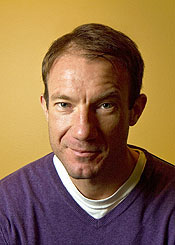UC Santa Cruz bioinformatics expert Richard Green and his coauthors of a landmark paper describing the Neanderthal genome have been chosen to receive the prestigious Newcomb Cleveland Prize from the American Association for the Advancement of Science (AAAS). The prize is given annually to the authors of an outstanding paper published in the association's journal Science.
Green, an assistant professor of biomolecular engineering in the Baskin School of Engineering at UC Santa Cruz, began working on the Neanderthal genome project as a postdoctoral researcher at the Max Planck Institute for Evolutionary Anthropology in Leipzig, Germany. He led a major bioinformatics effort, writing software and developing computational techniques needed to analyze ancient DNA extracted from fossil bones. He also coordinated the overall design and logistics of the project.
The prize-winning paper, "A Draft Sequence of the Neandertal Genome," was published in the May 7, 2010, issue of Science. It prompted a worldwide flurry of media coverage, mostly focused on the discovery of Neanderthal DNA sequences in the genomes of present-day non-Africans, indicating that Neanderthals and humans interbred shortly after early modern humans migrated out of Africa. The Neanderthal genome has also enabled researchers to identify genetic features that are unique to modern humans.
Green is first author of the paper, which involved 56 coauthors from 22 different institutions. The coauthors include Svante Pääbo of the Max Planck Institute and David Reich of Harvard Medical School.
The team obtained the draft sequence of the Neanderthal genome by analyzing DNA extracted from 40,000-year-old bones of Neanderthals. Extraordinary efforts were required to prevent contamination of the samples with human DNA, and new techniques were developed to deal with the large amounts of bacterial DNA present in the fossil bones. In December 2010, Green and other members of the same team published a second groundbreaking paper based on ancient DNA, this time describing a previously unknown group of human relatives, called "Denisovans," who lived in Asia at the same time as humans and Neanderthals.
The Newcomb Cleveland Prize, supported by Affymetrix, is the oldest AAAS award, established in 1923 with funds donated by Newcomb Cleveland of New York City. Each recipient receives a bronze medal and a share of the $25,000 prize.
A formal presentation of the prize will take place at an awards ceremony on Saturday, February 19, at the AAAS annual meeting in Washington, D.C.



